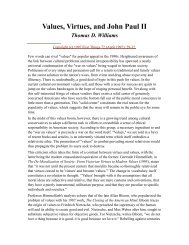Person-centred coaching psychology: A meta-theoretical perspective
Person-centred coaching psychology: A meta-theoretical perspective
Person-centred coaching psychology: A meta-theoretical perspective
Create successful ePaper yourself
Turn your PDF publications into a flip-book with our unique Google optimized e-Paper software.
<strong>Person</strong>-<strong>centred</strong> <strong>coaching</strong> <strong>psychology</strong>Implications for training and practiceBut what are the practical implications of<strong>coaching</strong> <strong>psychology</strong> adopting the person<strong>centred</strong><strong>meta</strong>-theory as opposed to themedical model? There are four key areas todiscuss: who we work with, what we train to do,what we do in practice, and who we work for.1. Client groupWhat we call ourselves professionally determineswho we work with, and to that extentcoaches and therapists work with differentpopulations (Grant, 2001). But, to definethe profession in this way is to belie a morecomplicated picture and to implicitlycondone the medical model view. As alreadyemphasised, the person-<strong>centred</strong> <strong>perspective</strong>provides a unitary way of working with clientsalong the spectrum of functioning. Theoretically,a person-<strong>centred</strong> <strong>coaching</strong> <strong>psychology</strong>is applicable to the range of clinical andhealth care settings, constrained only by thedepth and duration of experience andtraining of the practitioner, rather than anyarbitrary discontinuity between well-beingand psychopathology.If <strong>coaching</strong> <strong>psychology</strong> adopts the <strong>meta</strong><strong>theoretical</strong><strong>perspective</strong> of person-<strong>centred</strong>theory it may come into conflict with otherdivisions of professional <strong>psychology</strong> who viewmaladaptive functioning as their domain.But the possibility of conflict should notstand in the way of developing a theory ledprofession if the dichotomous thinking ofthe medical model is simply incorrect andunhelpful. Certainly, <strong>coaching</strong> is not aboutthe alleviation of distress and dysfunction perse, but it is about the facilitation of well-beingand optimal functioning. However, the questionis whether these are in reality a unitarytask rather than two separate tasks?Within the person-<strong>centred</strong> <strong>perspective</strong>, itdoes not matter where the person starts,<strong>coaching</strong> can be valuable to all. As Shlien, oneof the founders of person-<strong>centred</strong> <strong>psychology</strong>,said in a talk originally given in 1956:‘…if the skills developed in psychologicalcounselling can release the constructivecapacities of malfunctioning people sothat they become healthier, this samehelp should be available to healthypeople who are less than fullyfunctioning. If we ever turn towardspositive goals of health, we will care lessabout where the person begins, andmore about how to achieve the desiredendpoint of the positive goals’ (Shlien,2003, p.26).Depth and duration of training and experienceare the only issues, therefore, in determiningwhere on the spectrum ofpsychological functioning a person-<strong>centred</strong><strong>coaching</strong> psychologist is able to work. Thereare also other practical issues, such as theassessment of self-harm, which a competentpractitioner must be aware of. But the <strong>theoretical</strong>principle that <strong>coaching</strong> <strong>psychology</strong> isapplicable across the spectrum of psychologicalfunctioning stands in contrast to themedical model view that <strong>coaching</strong><strong>psychology</strong> would only be applicable to nonclinical and relatively highly functioningpopulations.2. TrainingThere are implications for training. Trainingprogrammes that are influenced by themedical model will emphasise the developmentof intellectual knowledge so that thecoach can take on the role of expert.Training programmes that are influenced byperson-<strong>centred</strong> principles will emphasise thedevelopment of the self-awareness of the<strong>coaching</strong> psychologist and their interpersonaland emotional literacy skills, and inlearning how to facilitate self-determinationin others. Training in person-<strong>centred</strong>practice is very different to what mostpsychologists learn in their training. Groom(2005) in writing about how his practice hasdeveloped, says:‘Most of my <strong>coaching</strong> time is spenttripping over myself. I can hardly wait toexplore the coachee’s issues before I amrushing in to get them ready to set goals,or to analyse their lifestyle imbalance, doa cognitive checklist or evaluate their ownself-care strategies. I am learning to slowInternational Coaching Psychology Review ● Vol. 1 No. 1 April 2006 51



